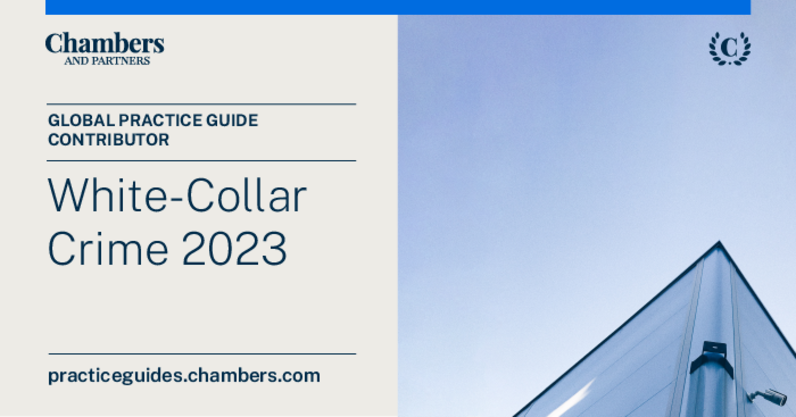
White-Collar Crime in the UK | 5SAH Chambers writes for Chambers & Partners Global Practice Guide 2023 | Trends & Developments
Overview
There has been no shortage of government initiatives in the last few years, including the Economic Crime Plan (2019) and the CPS’s Economic Crime Strategy (2021) to name but two. In May 2023, the government published Economic Crime Plan 2, setting out the objectives and methods for 2023–2025, and focusing on:
- reducing money laundering and recovering more criminal assets;
- combatting kleptocracy and driving down sanction evasion; and
- cutting fraud.
In Parliamentary terms, the Economic Crime (Transparency and Enforcement) Act 2022 is now in force, and the Economic Crime and Corporate Transparency Act and the Online Safety Act have recently received Royal Assent. Public manifestation of the government’s success in these objectives is somewhat hampered by delays in bringing cases to prosecution, still partly due to the onerous requirements of the disclosure regime, and then, post-charge, the delays and backlog in the criminal courts.
Money laundering
Just as a nomenclature of fraud typology has emerged, so the various types of money laundering techniques have evolved from the relative simplicity of “money mules” or “alternative remittance systems”. The nature of the UK economy, coupled with its vibrancy as a financial centre, lends itself to both High-End Money Laundering (HEML) and Cash Based Money Laundering (CBML), with the National Crime Agency (NCA) estimating that over GBP100 billion is laundered through and within the UK or UK registered corporate structures each year using HEML. International Trade Based Money Laundering (TBML) also seems to have used UK registered corporate structures on a grand scale.
A new kid on the block (which may in fact have been around for many years) is “Daigou”, or the apparently straightforward purchase of high-value luxury products in the UK for export. This seems to have become a recognised method of money laundering, although difficulties in reclaiming the VAT may just have made it 20% less attractive! Other techniques will doubtlessly emerge (or become appreciated) as law enforcement tries to keep up with the criminals.
One of the main goals of the Economic Crime and Corporate Transparency Act is to reform the role of Companies House and improve transparency in relation to UK companies and partnerships with a view to reducing the risk of UK companies being a vehicle of choice for facilitating money laundering, fraud, corruption, terrorist financing and illegal arms movements. Those who have been involved in cases involving money laundering will be aware of the frequent appearance of UK shell companies or limited partnerships, with Scottish limited partnerships in particular being flavour of the month in some sectors.
The Act will bring about the most significant change to the UK’s regime for registering companies in the last 170 years, and will provide Companies House with enhanced powers to verify the identities of those setting up, managing and owning companies. Companies House will also be able to use enhanced intelligence capabilities to challenge and reject information filed with it and proactively share information where it has evidence of anomalous filings or suspicious behaviour.
Alongside UK corporate structures, overseas corporate entities and trusts remain a means through which illicit funds can be laundered, particularly in the purchase of UK property which has traditionally been at risk from money laundering. Following the introduction of the Register of Overseas Entities in 2022, overseas companies are now required to provide the real identities of their owners to try to prevent illicit funds being laundered through the UK property market. This should go some way towards addressing the surprise of some law enforcers at the decision in NCA v Baker [2020] EWHC 822 (Admin) that High Court Judges do not share the view that the use of complex offshore structures is, without more, a hallmark of criminality. The entries revealing beneficial ownership may well also trigger new enquiries of course.
Failure to prevent money laundering – a lost opportunity?
The government has decided that the new Act should not include a new offence of “Failure to Prevent Money Laundering”, rejecting the amendments proposed in the Lords by Lord Garnier KC and supported by Margaret Hodge MP, a formidable and experienced combination. Since almost all UK money launderers use banks or exchanges and are facilitated by agents, brokers and even solicitors to acquire property at some stage of the cycle, this may come to be seen as a lost opportunity to remove the reputation of “Londongrad”.
Even with the new corporate liability proposals, it is all too easy for an honest company to be let down by a middle-ranking employee or agent, and to become a facilitator. The Financial Conduct Authority (FCA) used the Money Laundering Regulations 2007 to prosecute NatWest in 2021, so the absence of a more general offence does not leave law enforcement entirely helpless, but such prosecutions are few and far between.
Asset recovery
The Economic Crime Plan 2 sets out how financial year 2021/22 saw a record level of assets being recovered under the Proceeds of Crime Act (POCA), totalling GBP354 million, and credits this as being due to a combination of the initiatives introduced by the First Economic Crime Plan and the Asset Recovery Action Plan that was introduced in 2019 to complement it. However, most of the major legislative changes were actually found in the Criminal Finances Act 2017. It is also suspected that EncroChat made a contribution.
Certainly, there has been no shortage of large confiscation orders being handed down by the Crown Courts in the last 12 months, with an order being made against Glencore in November 2022 for GBP93.5 million, which represented the benefit it obtained from bribes in five countries, and an order being made in July 2023 against James Ibori (the former Governor of the Delta state in Nigeria) for GBP101 million.
A breakdown of the GBP354 million figure reveals that GBP179 million derived from imposed confiscation orders (compared with some GBP645 million related to POCA restrained funds), GBP191 million came from civil forfeiture orders (frozen account, cash and listed assets forfeitures) and the remainder (a more modest GBP9.8 million) resulted from civil recovery orders. These figures confirm and highlight that law enforcement agencies have continued to embrace the additional tools introduced to POCA by the 2017 Act.
By the introduction of a new Anti-Money Laundering and Asset Recovery (AMLR) programme, the government intends to continue the trend of increased recovery of assets, which it says will include cross-border co-operation and additional resources for the Crown Prosecution Service (CPS). An ever-increasing number of interventions can therefore be expected, particularly in the use of account freezing orders, which are simpler to obtain for law enforcement and arguably more flexible and beneficial for the suspect than the alternative of a restraint order and subsequent criminal proceedings. However, one does sometimes wonder whether successful domestic criminals are sometimes being overlooked in favour of higher profile and more glamorous foreign targets.
The number of Suspicious Activity Reports (SARs), many of which are submitted so as to give the reporter a defence against money laundering, continues to rise. The NCA reports receiving more than 460,000 a year, and stores more than 2 million SARs on its database. Applications to extend the moratorium period have led to a little more transparency about the process in some cases, and also provide an early opportunity for the subject of an SAR to give an early explanation and perhaps avoid an asset freezing order or restraint order.
In July 2023, the CPS announced that it had obtained (albeit apparently by consent) a civil recovery order for GBP750,000 of crypto-assets after the Police had been able to reconstruct a digital wallet after finding “recovery seeds” in a black book at a suspect’s address. Part 4 of the Economic Crime and Corporate Transparency Act brings in new powers for the confiscation and search, seizure, detention and forfeiture of crypto-assets, and a Crypto Wallet Freezing Order (CWFO) seems likely to be added to the ever-growing list of POCA abbreviations. Coupled with the increased regulation of cryptocurrency and its exchanges by the FCA, more of these cases can be expected to come before the courts in the coming months.
Sanctions
After no fewer than 17 amending instruments to the Russia (Sanctions) (EU Exit) Regulations in 2022, the pace has calmed a little in 2023, with only three being in place at the time of writing. The list of Designated Persons has been growing throughout 2023. One individual's attempt to challenge his designation has failed at first instance (Shvidler v SSFCDA [2023] EWHC 2121 (Admin)), but the court did agree that it has power to scrutinise the exercise of the discretion. The judgment of Garnham J also provides enlightening information on the practical effects of sanctions upon an individual and their family.
Breaches of sanctions may be met by civil monetary penalties under Part 8 of the Policing and Crime Act 2017, but also by criminal proceedings. On 31 August 2023, the Office of Financial Sanctions Implementation published a disclosure report about a breach that occurred when a financial services company failed to prevent an ATM cash withdrawal of GBP250. More substantial cases of sanctions-breaking are expected to come before the courts in 2024.
Fraud and bribery
The principal excitement at present relates to the provisions in the Economic Crime and Corporate Transparency Act for new offences of failure of a “large organisation” to prevent fraud and the new proposals for the attribution of criminal liability to a body corporate or partnership where a senior manager, acting within the actual or apparent scope of their authority, commits a relevant offence. The listed offences to which the new provisions would apply are extensive.
The change in director at the Serious Fraud Office (SFO) will no doubt be closely watched by commentators for any new trends in the SFO's investigative appetite, and the outgoing director has recently announced the discontinuance of two long-standing investigations without criminal charges being brought against anyone at all. A change in the law of corporate criminality ought to be of significant assistance to the SFO.
The past year has also seen two high-profile arrests by the NCA of overseas officials on suspicion of bribery, highlighting the work of its International Corruption Unit. Commentators and legislators alike are likely to watch closely to see whether the NCA is more effective than the SFO in tackling these difficult cases.
In terms of pending cases, some action is expected in relation to COVID-related frauds and payroll frauds in particular, and money laundering and tax cases involving cryptocurrency.
There have been a number of successful private prosecutions for fraud in 2023, and this trend is expected to continue. The case law on challenges to the issue of private prosecution summonses has stabilised, and private prosecutors and defendants alike now have reasonable guidance as to the boundaries of motive in private prosecutions. Nonetheless, as some of the costs decisions have shown, a private prosecution is still not something to be embarked upon without careful thought and expert guidance. It is not as easy as it looks!
Extradition
The threat of extradition proceedings in white-collar crime cases remains a real one. The use (or misuse) of Interpol Red Notices means that it is sometimes difficult to tell if extradition is being sought for the purpose of prosecution or for political reasons, and proper scrutiny by the courts is essential. The United Arab Emirates is a jurisdiction where fugitives often run if there are allegations of fraud and money laundering. However, despite an extradition treaty dating back to 2008, the UAE's willingness to extradite those accused of criminal offences remains patchy. The operation of the rule of law is not always consistent and it is therefore difficult to predict extradition outcomes. However, with the number of fugitives reputed to be “somewhere in the UAE”, there is likely to be continued pressure from the UK at a diplomatic level to try and bring those fugitives to justice.
The rise and fall of cryptocurrencies have meant that there have been complex Interpol and extradition processes involving the collapse of Terraform labs with requests from South Korea and the US, and the collapse of FTX and a request for Sam Bankman-Fried from the Bahamas to the US. In the UK, the extradition of Mike Lynch in the Autonomy case (Lynch v USA [2023] EWHC 876 (Admin)) shows that the long arms of the US Department of Justice and the Securities and Exchange Commission present serious risks for both corporate clients and individuals.
Conclusions
For politicians, 2024 may well be dominated by election promises. There seems to be a compelling public mood that “something should be done” about the huge scale of fraud that is well recorded but about which seemingly little action is taken. Money laundering may be a greater concern at a political and business level, but there is no doubt that there is a strong feeling, perhaps encouraged by recent events, that the reputation of “Londongrad” should be tackled, albeit without the assistance of a new general “failure to prevent” offence for money laundering. But it will now be an offence for some corporates to fail to prevent fraud, as well as bribery and tax evasion. There should therefore be an active year ahead on all fronts – legislative, enforcement, pre-charge engagement to avoid prosecutions and, no doubt in some cases, conclusions in criminal proceedings and asset recovery, or both.
5 St Andrew's Hill (5SAH) has a national and international reputation for excellence. In white-collar crime, it represents the interests of individual and corporate clients in pre- and post-charge financial and regulatory offences. 5SAH business crime barristers are instructed in high-value and complex white-collar and regulatory criminal investigations, associated hearings and trials. The team is regularly instructed to act in complex and serious financial services cases on behalf of both prosecution and defence. Areas of expertise include SFO, FCA criminal investigations, Cum-Ex and other market manipulation offences, money laundering, deferred prosecution agreements and all types of fraud work, as well as POCA, asset freezing and forfeiture, restraint, civil recovery and search warrants. 5SAH is a market leader in bringing and defending private prosecution cases. The team offers expertise in multi-jurisdictional investigations, often utilising experience in extradition, sanctions and Interpol Red Notices, including the drafting of expert reports.
Andrew Bird KC took silk in 2021 following five years as Standing Counsel to RCPO and ten years on the Treasury Civil A Panel, as well as being on the SFO A Panel, during which he was involved in two of its largest bribery investigations, as well as dealing with the confiscation proceedings for Petrofac. He both prosecutes and defends white-collar crime, including private prosecutions, alongside a specialist practice in civil and criminal asset recovery and judicial review challenges to criminal investigations and process.
He is ranked in Chambers and Partners in the fields of POCA and Asset Forfeiture (Band 1 Silk), Financial Crime and Private Prosecutions - Financial Crime. He is ranked in The Legal 500 in the field of POCA and Asset Forfeiture and is also recognised in Who's Who Legal at the UK Bar in the fields of Asset Recovery, Civil Fraud, and Criminal Fraud.
Sarah Wood specialises in asset recovery and criminal fraud work, and is one of a handful of counsel at the Bar with demonstrable experience of dealing with cases where there are contemporaneous proceedings in the criminal and family courts. Sarah is joint head of the business crime team at 5SAH and is highly recommended for her confiscation and asset recovery work. She is ranked in The Legal 500 (Tier 1) and Chambers & Partners (Tier 2) for her Confiscation & Asset Recovery work. Sarah is also recognised in Chambers & Partners for Financial Crime - Private Prosecutions, in the exclusive spotlight table. She was the Winner of The Legal 500 UK Bar Awards 2023 for Financial Crime junior of the year.
Ben Keith is a leading barrister specialising in cross-border and international cases. He deals with all aspects of extradition, human rights, mutual legal assistance, Interpol, financial crime and international law, including sanctions. He represents governments, political and military leaders, high net worth individuals, human rights defenders and business leaders in the most sensitive cases. Ben is recognised in Chambers and Partners' High Net Worth Guide: Financial Crime. He is ranked in Chambers and Partners as a band 1 leader in the field of Extradition at the London Bar and in the Legal 500 as a Tier 1 leading individual in international crime and extradition. Ben is also ranked in Chambers & Partners in the field of Immigration.




